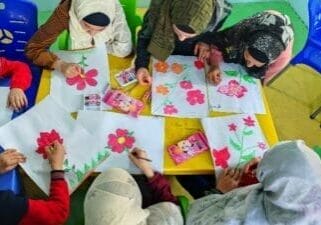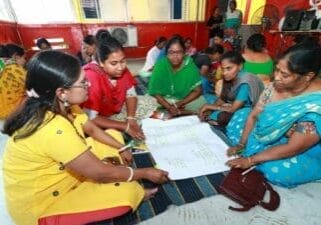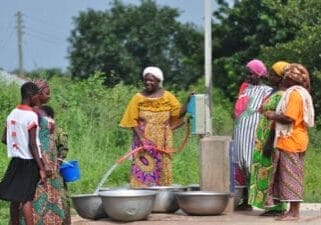News > Blog
Accessing Higher-Value Local Markets: Lead Firm Collaboration is a Win-Win
Published 10/03/2016 by Global Communities
Accessing Higher-Value Local Markets: Lead Firm Collaboration is a Win-Win
By Tuul Tuvshinbayar, Program Manager, Global Communities’ EMIRGE program
This article originally appeared on The SEEP Network.
Smallholder producer cooperatives tend to have low production volumes. When cooperatives are successful in increasing their production, they often face problems with proper storage and finding markets. Cooperatives and their products are often unknown to other market players, and their products may or may not be suitable to the end market they seek. When cooperatives are strategically introduced to lead firms, and relationships are fostered and developed, lead firms often start to buy products from the cooperatives, which leads to a win-win relationship for all parties involved.
The Case of Mongolia
I’ve been fortunate to see this process play out many times over in Mongolia with the dairy industry. Seasonally, from February through the end April, dairy processing companies face a lack of milk which they need to make a wide variety of dairy products. Generally, in supermarkets across Mongolia there is usually no soft curd (nor many other dairy products) to be found during that time.
Tunhel Suu cooperative, as one of the 18 dairy cooperatives involved in Global Communities’ EMIRGE program, produces soft curd cheese. This cheese, which is similar to feta cheese, is a traditional dairy product which Mongolians eat year-round for breakfast and use for baking cakes. In 2015, as a result of production-oriented work from EMIRGE since 2013, Tunhel Suu produced around 2 tons (2,000 kg) of soft curd cheese and planned to sell it at a market rate of 3,500-4,000 MNT (USD $1.56-$1.79) per kg. However, they struggled to find a potential buyer for this product.
In December 2015, the EMIRGE program sponsored a dairy sector stakeholder round table discussion, which introduced Tunhel Suu to the Suu Company (no relation), a dairy manufacturing company that buys soft curd cheese as a primary raw material for a variety of their branded products. During the round table, Tunhel Suu shared their results and challenges in finding a buyer for their soft curd. Meanwhile, the Suu Company had too struggled with finding enough product during the winter.
Win-win for the Dairy Industry
As a result of discovering their mutual interest at the round table event, the company and cooperative began to work together, with the company providing the much needed guidance, support and feedback to the cooperative. To start, the Suu Company conducted a series of laboratory tests of the cooperative’s products, which were found to be generally adequate, but improvements were needed. In order to do this, the company provided technologist N. Tsendsuren, who stayed with Tunhel Suu for three days, providing her expertise on topics such as how to handle and store the product properly, achieving and maintaining the right boiling temperature, cooling procedures, and using the right cheese cloth to strain the liquid from the solids.
Employing a Facilitation Approach
A critical factor in developing this relationship was that the EMIRGE team took a facilitator role throughout the whole process of developing a buyer-seller relationship and helped each side to understand the others concerns in terms of market demands for high quality and hygiene.
As a result of this collaboration, Tunhel Suu’s product quality and hygiene increased and they found a reliable and trusted market channel and supportive leading firm. Tunhel Suu is now in the process of negotiating the price for soft curd cheese they will sell to the Suu Company in the upcoming spring 2017 season. As a result of the collaboration between Tunhel Suu cooperative and its lead firm, they have now further expanded and diversified their market channels. In addition to selling to the Suu Company, they also sell 80 kg per month of the soft curd to Bat-baigal, Sara’s and Jur-Ur bakeries and 40 kg per month to Saruul market. While Tunhel Suu’s revenues have increased at a modest rate since 2012, they are very hopeful for the future now that they have a trusted partner, the knowledge on following industry standards, and number of diversified group of new buyers. Baigalmaa Ts, a member of Tunhel Suu expressed this hope, stating “after working with a lead firm, our cooperative’s product taste and quality is improved and we can store the product properly and longer. This will allow to expand our market and I believe that our cooperative can extend market continuously.”
Working and Learning Together at #SEEP2016
The SEEP Annual Conference peer learning session “Farm to Supermarket: How to Access Higher-value Local Markets” featured insights from Global Communities’ work to help Mongolian smallholder dairy farmers supply domestic supermarkets and TechnoServe’s partnership with the Walmart Mexico Foundation to help integrate smallholders into profitable value chains. The session looked at the barriers that often prevent smallholders from supplying these higher-value markets, the success factors used to break down those obstacles in each initiative, the replicability of these approaches, and the best practices for implementing them.
Tuul Tuvshinbayar has 13 years’ experience in the cooperative sector and overseeing 53 cooperatives with over 700 members. Tuul is the Team Lead of the USAID funded Enabling Market Integration for Rural Group Empowerment (EMIRGE) program which works with Mongolian farmers in the dairy and vegetable sectors to increase their production yields through cooperative development. She is deeply involved with cooperative programs in efforts to enhance program effectiveness, and raise incomes of clients. Her work also involves building networks between small farmers, key sector players, local associations, NGOs as well government authorities.





